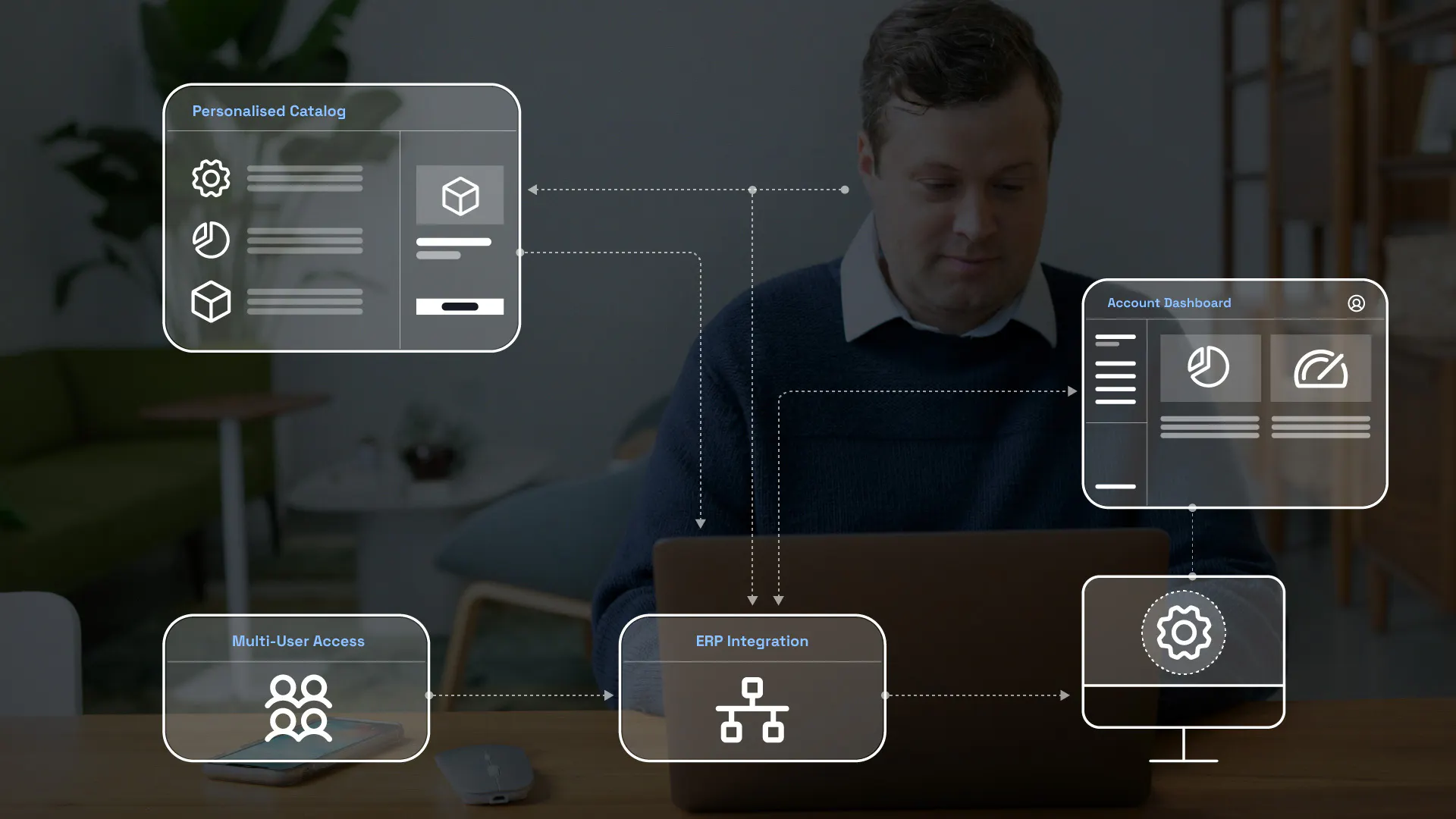Top Features Every B2B Ecommerce Site Must Have
Essential Features for Modern B2B Online Stores

By Foster Commerce
Jul 9, 2025

Does your B2B website offer an online experience that keeps customers coming back?
This article highlights the features every B2B ecommerce website must have to stay competitive in today’s market. From account management to backend integration, the right tools help you build a platform that works for your business and delivers real value to your buyers.
Understanding the Unique Demands of B2B Ecommerce
B2B ecommerce isn’t just a more complex version of retail. Buyers in this space operate differently. They rely on purchase approvals, bulk ordering, contract terms, and real-time inventory. These expectations mean your ecommerce platform must do more than display products. It needs to support the whole buying process.
B2B website features should support how actual buyers purchase and maintain ongoing customer relationships. B2B clients expect personalized pricing, negotiated agreements, and even custom catalogs. A platform built for B2B must handle features like multiple users per account, role-based permissions, and detailed product data. It should also integrate with systems such as ERP and CRM to ensure accurate pricing and stock levels.
At Foster Commerce, we’ve seen how tailored ecommerce solutions give B2B businesses an edge. If your site feels outdated, it might be time to rethink how technology supports your customer relationships.
Customizable Product Catalogs: Meeting the Needs of Complex Industries
In B2B ecommerce, your product catalog is a powerful tool that supports complex buyer needs. Whether you serve industries like automotive, agriculture, or industrial equipment, your catalog must show the right products to the right buyers, with accurate data and context.
Here’s what an effective, customizable B2B catalog should offer:
Segmented product views by customer type or region
Show buyers only the products relevant to their business or location. This keeps the experience focused and eliminates unnecessary clutter.Support for contract-specific pricing and inventory
Display pricing and stock based on existing agreements. This helps maintain transparency and speeds up procurement.Access control for regulated or restricted items
Limit visibility of certain products based on compliance requirements or user roles. This is especially useful in industries with strict purchasing guidelines.Configurable bundles and part compatibility Allow buyers to build orders from compatible components or order kits tailored to specific use cases. This reduces errors and improves ordering efficiency.
Integration with internal product information systems Ensure that catalog data stays in sync with backend systems. This helps your team maintain accuracy across marketing, sales, and fulfillment.
At Foster Commerce, we support this complexity through the platforms we build with—Craft Commerce, OroCommerce, and Shopify Plus. We can customize tools like plugins or apps to match needed workflows. Our development gives businesses websites that are built for B2B scalability and product personalization for buyers.
A smart, flexible product catalog is essential for helping buyers find what they need, fast. At Foster Commerce, we help B2B businesses build catalog experiences that are efficient, scalable, and aligned with industry demands.
Streamlined Ordering and Account Management for Superior Experiences
Ordering should be easy. If your site frustrates buyers, they’ll notice and remember. B2B customers want tools that save them time: simple dashboards, fast reordering, and visibility into their purchasing history.
With modern platforms, you can offer role-based access, approval workflows, and custom order paths that match your clients’ internal processes. This isn’t just about user experience, it’s about function.
When buyers log in, they should immediately see what matters to them: contract pricing, frequently ordered products, and order tracking. The easier you make it to buy, the more often they’ll come back.
At Foster Commerce, we specialize in creating B2B ecommerce sites that feel intuitive and reliable. A better experience builds stronger client relationships.
Integrating Multiple Platforms for Seamless Back-Office Operations
A polished storefront is important, but it’s the backend that keeps everything running. If your ecommerce site doesn’t integrate with ERP, CRM, inventory, or shipping tools, you’re adding friction to every transaction.
Good integration reduces manual work and costly mistakes. Real-time syncing between your ecommerce platform and your internal systems keeps data accurate from pricing and stock to invoices and shipping.
Craft Commerce, Shopify Plus, and OroCommerce can connect with industry-specific tools in manufacturing, wholesale, and logistics. With the right feature set, your integrations become more than technical glue, they enable operational clarity.
At Foster Commerce, we help B2B businesses build integration strategies that scale. The goal is to eliminate bottlenecks and support smoother operations across every department.
Moving B2B Buyers to Online Commerce: Actionable Steps for Adoption
Shifting traditional B2B buyers from offline processes to your ecommerce platform takes more than launching a new website. These buyers are used to sales reps, negotiated deals, and familiar workflows. To encourage adoption, your strategy must center on education, trust, and support.
Communicate the benefits clearly and often
Help buyers understand how the ecommerce site improves their experience. Highlight time-saving tools like real-time inventory visibility, quick reordering, and account-specific pricing to reinforce value. Many of these are must-have features on any modern B2B site.Offer low-friction ways to explore the platform
Set up sandbox environments, demo sessions, or limited-access accounts so users can get familiar without pressure. Reducing the risk of change encourages more buyers to take that first step.Mirror familiar offline terms and workflows
Ensure that buyers see their negotiated pricing, purchasing terms, and order history within the site. This consistency builds confidence and helps transition existing habits to digital processes.Empower your internal team to support adoption
Train account managers and sales reps to guide buyers through using the site. When support is proactive and informed, buyers are more likely to make the switch successfully.Roll out in phases and gather feedback
Launch gradually, starting with a core group of users who can test and provide insights. Their feedback helps you refine the experience and build momentum across the broader customer base.
Helping B2B buyers move online takes a thoughtful approach and the right tools. At Foster Commerce, we work with teams to build ecommerce experiences that feel familiar, functional, and worth using. When you align your platform with your buyers’ expectations, adoption becomes a natural step forward.
Plan Your Next Step Toward a Smarter B2B Ecommerce Site
At Foster Commerce, we design and build powerful B2B ecommerce websites that connect seamlessly with the tools and workflows your business depends on. From tailored product catalogs to ERP integrations and customer portals, our team helps you create a web experience that supports how your buyers work. If your current page setup no longer fits, and you need ecommerce that actually functions at scale, let’s talk.

